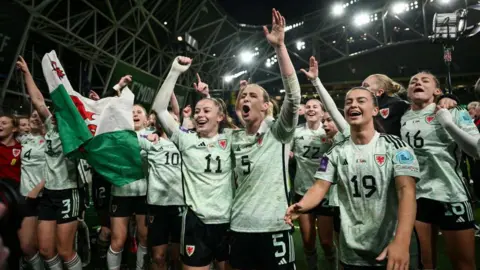 Getty Images
Getty ImagesIt was the final whistle they had waited a lifetime for, with an impact that could now be heard by generations to come.
There were emotional scenes in Dublin on 3 December as Wales’ players realised the dream of qualifying for major women’s tournament for the first time.
It means Jess Fishlock and her team will take their place on one of the biggest stages in women’s sport when they compete at Euro 2025.
The significance for Welsh football is being tipped to stretch far beyond the month-long tournament in Switzerland, but how will Euro 2025 make a difference for Welsh women’s football?
Will there be an increase in grassroots participation?
Anticipation is already growing ahead of group games against former winners the Netherlands, Euro 2022 semi-finalists Frances and defending champions England.
Already on the up, Welsh football officials are predicting qualification will have a huge boost on the number of girls playing football in the nation.
Studies showed that a year after England’s Euro 2022 victory there was a 140% increase the following season.
There has been growth in Wales for a while, with the number of girls at registered clubs having rapidly rising since 2016, when the men’s team reached the Euros semi-final.
In 2016 the number of players was about 6,000. The Football Association of Wales (FAW) had already set a target of 20,000 players by 2026 and is now at about 18,000.
The boost could actually be bigger, with those figures not including football played at schools.
“I think we’ll smash that target now with the team qualifying,” said chief football officer Dave Adams.
“I’m really hoping it acts as a catalyst and inspires others to be the next generation’s Jess Fishlock, Angharad James and Rhiannon Roberts.”
Wales’ most-capped player and record goalscorer Jess Fishlock said: “The whole point of this, initially [was that] I wanted to grow the game for the future and make it better than what it was, so I think I can sit here and say we did a pretty good job at that.
“Not only can you want to be a footballer and play for the women’s national team, but it’s a very valuable and valid career path if that’s what you want to do. It’s going to be huge for girls that want to play moving forward.”
Alys Carlton, the independent chairwoman of FAW’s board of directors said grassroots was “what it is all about”.
Begw Elain, vice chair of the FAW youth council, said she hoped it would bring more women to volunteer in the game as well to build a women’s presence in grassroots.
“It will bring confidence into women in sports here in Wales and inspire many more generations.”
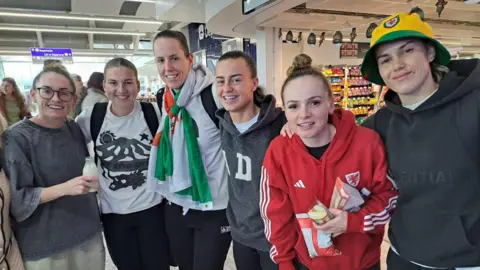
Officials believe the increased visibility, as well as key Welsh role models, will have a similar effect as the men’s side in 2016.
Ahead of qualification, former Wales captain and UEFA vice-president Laura McAllister, said Wales was “savvy enough” to take this opportunity to grow the game and that women’s football in Wales could hit “stratospheric heights”.
“For me, I think it’ll probably be the single most important historical thing to happen, maybe even in women’s sport, not just football,” she added.
Fishlock said the win had got Wales women over a “monumental line that we’ve been waiting for for a long time”.
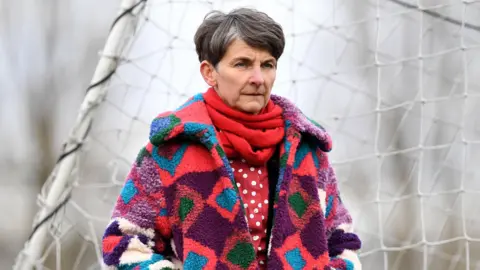 Getty Images
Getty ImagesHow will coaching be affected?
The hope is that there won’t just be a spike in young players, but also interest in coaching.
The FAW accepts there are still issues when it comes to attracting women coaches into the game, with many acting as chairwomen or secretaries of junior and grassroots clubs but not opting to step on to the training ground.
But one coach said Wales qualifying was “going to be invaluable”.
Nia Davies coached play-off goalscorers Lily Woodham and Carrie Jones at junior level and now leads Wales’ under-19s.
She said: “We are seeing far more females on the courses than before and now seeing what Rhian Wilkinson has done is so motivating for those on that career path.”
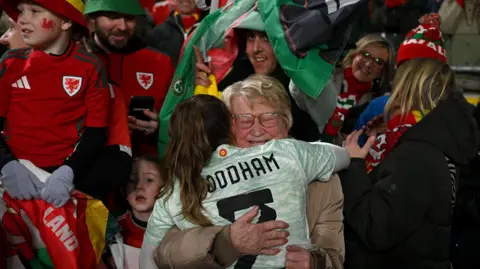 Getty Images
Getty ImagesDavies said she believed Euro 2025 would leave “a legacy” and could be “potentially massive for female sport in general, not just football”.
She also expects to see more men seeing women’s football as an attractive coaching option too.
The effect of showing the game on TV
Wales head coach Wilkinson said she wanted to frame the moment Wales’ name came out of the hat in the draw for the group stages, a moment that signified their place among the elite of European football.
The visibility of the terrestrially-televised tournament is expected to build on huge strides in the interest in the women’s game.
Euro 2022 in England saw record attendances broken, with UEFA claiming 84% of surveyed spectators saying the finals had improved their perceptions of women’s football.
Wales’ average crowd has already climbed from 1,800 in 2021 to 5,370 even before the home Euro play-off games.
Also, 350,000 viewers tuned into the Ireland v Wales coverage in Wales, with a further 400,000 watching across the UK – the highest since the Wales v England World Cup qualifier in 2018.
BBC Wales director Rhuanedd Richards said the next 12 months could provide the platform to transform support for women’s sport.
She added: “By giving our women athletes and teams individual and collective visibility, by valuing their achievements, creating heroes and by advocating for fairness, we are creating a path for broader social change.”
McAllister said the men’s semi-final run 2016 “ignited a nation in terms of support” and millions of people “heard our anthem, they saw our flag, they engaged with the fans”.
Ms Davies said games being on TV was “vitally important” because “you can’t be it if you can’t see it”.
Ms Elain said: “I think it not only brings publicity and respect for women in football but also money from the national to the grassroots.”
How will Wales benefit financially?
Wales will benefit financially from just making it to Switzerland, with the FAW banking about £1.5m before any further bonuses for wins.
Some of the cash will be taken up by travel and facility fees, as well as paying players.
But the real reward comes from the sponsorship spin-offs and commercial tie-ins – not to mention the ability to attract future investment that officials said was hard to put a price on.
Some companies are keen to align with the women’s game, seeing it as a positive brand more worthy of support than rival sports or even the men’s game.
And, with the boom expected to continue, there will be a need to make the most of Wales’ Euro opportunity.
“Our problem is going to be there’s thousands and thousands of girls who want to play football – what a great problem to have but the issue is facilities, coaches and making sure we have the infrastructure,” admitted FAW chief executive Noel Mooney.
“We’re having positive discussions with the Welsh government and local authorities so we can build the thousands of pitches we need to cater for the explosion in girls wanting to be the next Jess Fishlock and Sophie Ingle come the end of the tournament.”
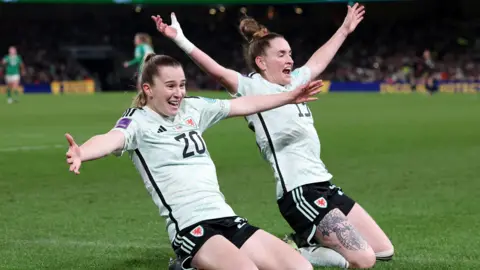 PA Media
PA MediaMs Davies said “we as an organisation need to capitalise on the opportunity” with better grassroots participation, commercial sponsors and investment allowing the FAW a better platform to achieve their strategy for the women’s and girls game.
Ex-Wales international Helen Ward said: “For so long we’ve been almost living in the shadows. We haven’t quite taken that next step – this is it.
“For the women and the girls I feel like this is that moment, you know, its our moment.”

